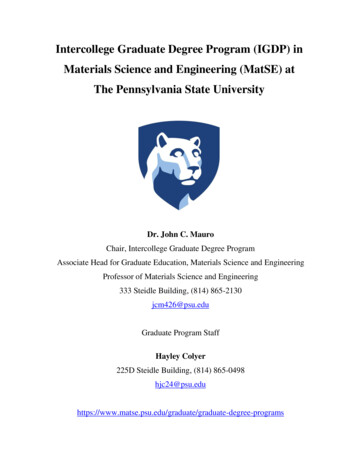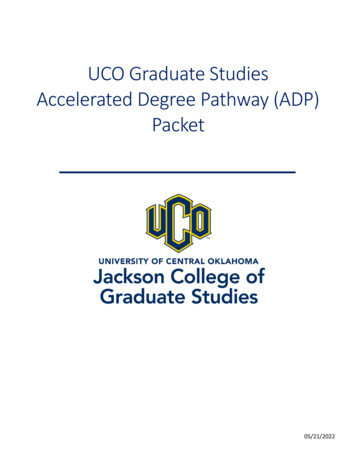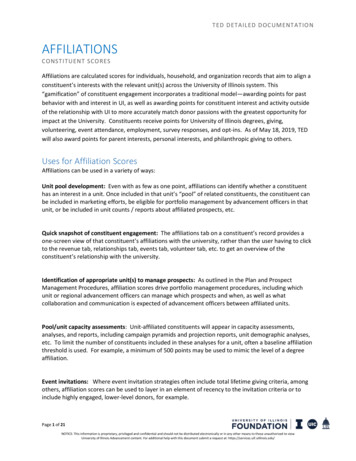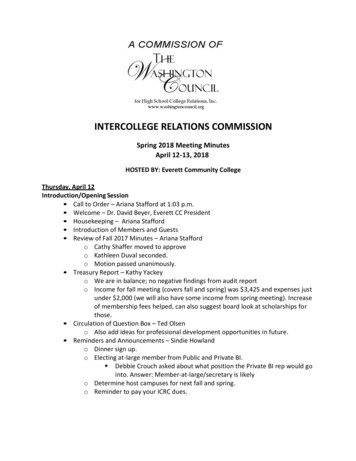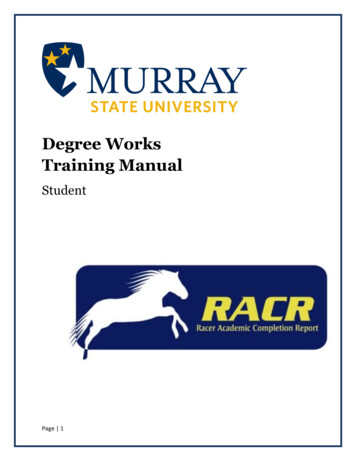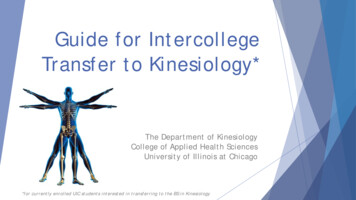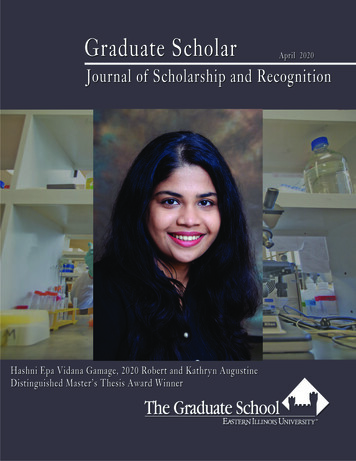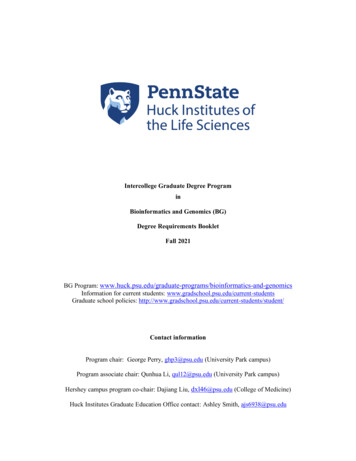
Transcription
Intercollege Graduate Degree PrograminBioinformatics and Genomics (BG)Degree Requirements BookletFall 2021BG Program: and-genomicsInformation for current students: www.gradschool.psu.edu/current-studentsGraduate school policies: dent/Contact informationProgram chair: George Perry, ghp3@psu.edu (University Park campus)Program associate chair: Qunhua Li, qul12@psu.edu (University Park campus)Hershey campus program co-chair: Dajiang Liu, dxl46@psu.edu (College of Medicine)Huck Institutes Graduate Education Office contact: Ashley Smith, ajs6938@psu.edu
ContentsBioinformatics and Genomics (BG) Program Objectives ------------------------------------ 3General Information ------------------------------ 6Doctoral Minor ----------------------------------- 8Masters (M.S.) Degree --------------------------- 8M.D./Ph.D. Degree ------------------------------- 8Ph.D. Degree --------------------------------------- 9Representative Course Schedule for Bioinformatics & Genomics PhD Students ------ 15Brief Descriptions of BG Courses ------------ 16English Proficiency ------------------------ 18Student-Faculty Compact ---------------------- 19Appendix 1: Huck Institutes Resources -------212
Bioinformatics and Genomics (BG) Program ObjectivesBioinformatics and Genomics (BG) is an interdisciplinary graduate program that integrates three focal areas ofresearch: Computational, evolutionary, and functional genomics. Students will be trained in bioinformatics,computation, statistics, genomics, and systems biology. The main objectives are to: Provide students with comprehensive training in the use and development of advanced bioinformatics,computational, and statistical approaches to collect, process, analyze, integrate and interpret complex, largescale genomic data.Provide students with an in-depth understanding of the potential application of these approaches to basicand applied research and the skills to communicate results to a broad audience.Enhance collaborative environment to facilitate productive interactions and creative efforts in genomicsand bioinformatics research.These objectives will be met in part by offering a set of required and elective courses, which are designed to provideopportunities to develop knowledge in the following and other areas: Foundations of genomics, i.e. molecular geneticsSequencing technologies, genome assembly, alignments, read mappingBasic bioinformatics programming and scriptingAlgorithm development in bioinformaticsStatistical methods in genomics and bioinformatics; competence in R or equivalentIdentification and analysis of functionally important components of the genomeTranscriptomics techniques (microarray, RNA-seq) and analysisGenome variation, phenotypic trait mapping (e.g. genome-wide association studies)Comparative genomics, molecular evolution, signatures of negative and positive selectionThe following courses are required for all Ph.D., M.D./Ph.D., and M.S. students: BGEN 541 Critical Analysis in Bioinformatics and Genomics Research Topics (3)BGEN/MCIBS 551 Genomics (3)MCIBS 554 Foundations in Data Driven Life Sciences (3)BGEN 590 Colloquium in Bioinformatics and Genomics (1)MCIBS 591 Ethics, Rigor, Reproducibility and Conduct in the Life Sciences (2)STAT 555 Statistical Analysis of Genomics Data (3)BMMB 852 Applied Bioinformatics (2)BGEN 597 Special Topics: Python for Biologists (1)Additional courses for Ph.D. and M.D./Ph.D. students:All Ph.D. and M.D./Ph.D. students must complete one evolutionary genomics course (3 credits), selected from thebelow options or another course with prior approval from the program chair: BIOL 405 Molecular Evolution (3) BIOL 428 Population Genetics (3) ANTH or BIOL 460 Human Genetics (3)If a Ph.D. or M.D./Ph.D. student has not previously completed a statistics or probability course, they will also berequired to complete one of STAT 500 (3), STAT 501 (3), or STAT 502 (3).3
Additional courses for Ph.D. students only:Bioinformatics and Genomics Ph.D. students are required to complete at least three laboratory rotations in the firstyear of study, with registration in the following class each of the fall and spring semesters. BGEN 596 Independent Studies (1 credit x 2 semesters)Bioinformatics and Genomics Ph.D. students may be required to complete (or may choose to take) a pedagogycourse at least one semester prior to serving as a Teaching Assistant (TA) to meet the BG program’s teachingrequirement (see below), depending on stipulations of the department offering the course. For example, the Biologydepartment requires all TAs to complete BIOL 893 before teaching. BIOL 893 Experiential Teaching in Biology (1)An internship is optional for Ph.D. students. BGEN 595 Internship (1)Additional courses for M.S. students only: One of STAT 500 (3), STAT 501 (3), or STAT 502 (3)BIOL 405 Molecular Evolution (3)MS students will work with the program chair to determine whether they will be required to complete either athesis or an internship as part of their MS training. Approval of the thesis option is contingent on a BG facultymember agreeing to serve as the thesis advisor.Thesis option students (required credits and culminating experience): BGEN 600 Thesis Research (6) Acceptance by advisors/committee members of a thesis and pass a thesis defenseInternship option students (required credits and culminating experience): BGEN 596 Non-Thesis Research (4) BGEN 595 Internship (2) Acceptance by the program chair of a paper reporting results from an original research project. Theinternship is separate from the research project and data from the internship are not required for thescholarly paper.Notes on courses for all students:Students are advised to complete these courses during the first 18 months of study. The schedule of courses will bedetermined in consultation with the program chair.The program chair may approve waivers for one or more of the above courses depending on the assessment. M.S.students should keep in mind that they may need to immediately replace any waived courses with electives in orderto meet the 30 credit requirement during their relatively short time in the program.4
Besides the above required courses, the following are potential electives for BG students. Students may choose toregister for these (or other) courses in consultation with their doctoral advisory committee and/or program chair. BIOL 428 Population Genetics (3)BIOL 460 Human Genetics (3)BMB 484 Functional Genomics (3)BMB 497 Introduction to Bioinformatics (3)BMMB 533 Protein Evolution (3)BMMB 566 Algorithms and Data Structures in Bioinformatics (3)CHE 512 Optimization and Biological Networks (3)CSE 520 Science of Computer ProgrammingCSE 541 Database Systems ICSE 560 Theory of Graphs and NetworksCSE 562 Probabilistic AlgorithmsCSE 565 Algorithm Design and AnalysisIST 597 Machine Learning and Big Data Analytics (3)MCIBS 556 Computation, Bioinformatics, and Statistics Practicum (3)PHYS 580 Elements of Network Science and Its Applications (3)STAT 501 Regression Methods (3)STAT 502 Analysis of Variance and Design of Experiments (3)STAT 504 Analysis of Discrete Data (3)STAT 505 Applied Multivariate Analysis (3)STAT 508 Applied Data Mining & Statistical Learning (3)STAT 557 Data Mining (3)5
General InformationSafety Training:Within the first semester of residence, all students are required to take/pass safety and chemical waste disposaltraining sessions offered at the respective campus. For information and links regarding the Environmental Health& Safety office: esponsible Conduct of Research Training Requirement:First year students should complete the online CITI RCR course during or before the Orientation. To register, go tothe Penn State CITI website http://citi.psu.edu/ where you will find instructions. Select your campus, then selectPennsylvania State University Courses and register for the Biomedical Responsible Conduct of Research Course.Students must work on their own to complete the course modules and pass the on-line quizzes. All modules mustbe completed before 12:00 noon on the first day of class of the fall semester, and a copy of the student’s CompletionReport must be submitted to the Huck Institutes Graduate Education Office (101 HLSB or email ajs6938@psu.edu).After completing four years in the program, Ph.D. and M.D./Ph.D. students are required to re-take the onlineCITI RCR course and participate in two sessions of ethics discussions in MCIBS 591 course or equivalent. Acopy of the student’s Completion Report must be submitted to the Huck Institutes Graduate Education Office (101HLSB or email ajs6938@psu.edu).Academic Integrity:Academic dishonesty, cheating, and plagiarism are not tolerated by the University. Students should not “engage inor tolerate acts of falsification, misrepresentation or deception. Acts of dishonesty violate the ethical principles ofthe University community and compromise the worth of work completed by others”. Plagiarism violations willresult in disciplinary sanctions including dismissal from the BG Graduate program. University Policies for handlingstudent misconduct are available at: ity.html and licies/. Academic integrity violations will result in disciplinarysanctions and can result in a student’s dismissal from the Graduate Program.Grade Point Average:Credit hours are earned only for the grades A, B, and C. However, all A and F grades are included in the computationof the grade point average. Grade points are assigned as follows:A 4 (above average graduate work)B 3 (average graduate work)C 2 (below average graduate work)D 1 (failing graduate work)F 0 (failing graduate work)Grades D and F are not acceptable for graduate credit. If a course is repeated, then both grades are used in computingthe cumulative grade point averageUnsatisfactory Scholarship:Students are required to have a minimum grade-point average of 3.0 for the doctoral qualifying examination,admission to the comprehensive examination, dissertation defense, and graduation. One or more failing grades, acumulative grade-point average below 3.0, or failing any of the examinations may be considered evidence cedurestermination-unsatisfactory-scholarship/).6
Annual Graduate Student Activity Report:Annual Evaluations are an integral part of the student’s professional development. The thesis advisor (or theProgram Chair for students not yet settled in a lab) should conduct annual evaluations of the student’s progress andoverall performance and provide guidance with regard to future goals. While students and their advisors shouldmeet regularly over the course of a year, the annual evaluations ensure that at least one meeting has been held tospecifically look at the student’s progress and performance. Continued financial support of each student will bedependent on satisfactory progress as stated in admission offer letters. For M.S. students, their thesis advisors willbe provided a link to a separate form for evaluation. You may contact the Huck Graduate Programs Office to ensurethat your thesis advisor has received the form.A link to the online Annual Graduate Student Activity Report (GSAR) will be sent to all Huck graduate studentseach spring semester from the Huck Institutes Graduate Education Office. This online evaluation must be completedand approved by August 15 each year. Earlier deadlines will be assigned for each component of the report.https://grad-activity.science.psu.edu/Each student, in consultation with their advisor, will describe their research progress and plans according to theprompts that appear on the online form under the section “Progress and Future Plans”:1) Please provide a brief description of the current status of your research project.2) Please describe your research accomplishments over the past year.3) Please provide a description of your research plans for the upcoming year.In addition to this information, each student should provide all of the requested information such as publications,meetings attended, etc. The online system is self-explanatory but the Huck Institutes Graduate Education Officewill be happy to assist as necessary. Completed student reports will be reviewed by the Program Chair and, whenappropriate, by Troy Ott, Associate Director for Graduate Education in the Huck.Applying for Graduation:At the beginning of the semester that a student wishes to graduate:. Access LionPATH at www.lionpath.psu.edu and navigate to “academics” to choose “apply to graduate”. If not currently in the PSU system call 814-865-1795 to reach Graduate EnrollmentDissertation or Thesis submission:Students must present their dissertation in accordance with the Penn State University guidelines as described in theThesis and Dissertation Guide “Requirements and Guidelines for the Preparation of Master's and DoctoralDissertations".Web site: /7
Doctoral MinorDoctoral students who are not already part of the BG program may elect to complete a minor with the permissionof their doctoral committee. A minor consists of no fewer than 15 graduate credits of integrated or articulated workin one field related to, but different from, that of the major. A minor normally may be taken only in one of theapproved graduate degree programs offered at Penn State, or in a formal graduate minor program that has beenapproved by the Graduate Council. The minor field chosen must have the approval of the departments or committeesresponsible for both the major program and the minor field. At least one faculty from the minor field must be onthe candidate's doctoral committee.To earn a graduate minor in Bioinformatics and Genomics, students may take a subset of the following courses toreach the 15 total required credits:BGEN 541 Critical Analysis of Bioinformatics and Genomics Research Topics (3)BGEN 597 Special Topics: Python for Biologists (1)BMMB 852 Applied Bioinformatics (2)BGEN/MCIBS 551 Genomics (3)MCIBS 554 Foundations in Data Driven Life Sciences (3)STAT 555 Statistical Analysis of Genomics Data (3)Max one of the following: BIOL 405 Molecular Evolution (3), BIOL 428 Population Genetics (3), BIOL 460Human Genetics (3)Masters (M.S.) DegreeBG has some specific program requirements for conferral of the M.S. degree in addition to those described inGraduate School Policy GCAC-631 earch-masters/).Specifically, for the master’s degree, a minimum of 30 graduate credits and a 3.0 overall GPA are required. At least18 credits at the 500-level or above must be included in the program and there must be at least 12 credits in themajor at the 400-, 500-, 800-level. Required courses for master’s degree are detailed in the Program Objectivessection of this handbook. BGEN 600 Thesis Research may be counted towards the 30 credit minimum. BGEN 595Internship and electives also count towards the minimum 30 credit requirement. Program Options are not offeredfor the M.S. degree.MS students will work with the program chair to determine whether they will be required to complete either a thesisor an internship as part of their MS training. Approval of the thesis option is contingent on a BG faculty memberagreeing to serve as the thesis advisor. The thesis option requires acceptance of a thesis by advisors/committeemembers and the passing of a thesis defense. The internship option requires the completion of a paper reportingresults from an original research project (conducted apart from the thesis) with acceptance by the program chair.M.D./Ph.D. DegreeRequired courses for the M.D./Ph.D. degree are detailed in the Program Objectives section of this handbook.The dissertation committee of an M.D./Ph.D. student is formed upon entry into the dissertation laboratory and mustcomply with all Graduate Council requirements /). The committee must include at least two members of the BG programgraduate faculty and one M.D./Ph.D. steering committee member.8
M.D./Ph.D. candidates are required to have at least one paper submitted for publication in a major peer-reviewedscientific journal prior to the final doctoral examination, and this paper must be accepted before they return to thethird year of medical school. A dissertation must be prepared and defended by each M.D./Ph.D. candidate.Unless described otherwise in this section (i.e., the paragraphs immediately above this one) and excepting therotation, BG program qualifying exam (the requirement which is otherwise filled by passing the USMLE MedicalExam, BMS 506A, and BMS 506B), and teaching requirements, the requirements for the Ph.D. Degree describedbelow are also applicable to M.D./PhD. students.Ph.D. DegreeStudents in the BG Ph.D. program must complete the coursework detailed in the Program Objectives section of thishandbook. In addition, in consultation with the program chair, and based on the background and needs of the student,specific courses may be waived or additional courses required.Rotations/Mentor Selection:Ph.D. students will be required to be associated with research laboratories as a part of Independent Studies (BGEN596). Students will participate in at least three lab rotations beginning in their first semester. The choice of rotationlaboratories will be made in consultation with the chair of the BG program. Each lab rotation will be of 8 weeksduration. Students should aim to finalize the plan for their first rotation in the month prior to the start date andcommunicate their choice and ongoing decision process for subsequent rotations to the program chair. During therotations, students are expected to participate in a research project and other activities typical of a researchlaboratory.These rotations are very important because i) they are excellent training opportunities in and of themselves, ii) theygive students the opportunity to develop a deeper sense of what their PhD research in each labs would be like, andiii) for satisfactory progress in the BG program students must, via strong rotation project performance, demonstratethat they would be a good and productive member of a lab group to a PI who then acknowledges this by agreeingto serve as thesis advisor. Thus, it is important for students to conduct their rotations in labs that 1) they couldenvision potentially ultimately joining and 2) confidently have the ability to accept a new student at the end of theyear, assuming strong performance during the rotation. At the culmination of the first three rotations (by April 1),students may join one of these labs based on a mutually-positive rotation experience/performance and sufficientlyoverlapping research interests, for the remainder of the PhD training period. Fourth and fifth rotations are notnecessary but may either be necessary or desired (for example, see below discussion re: College of Medicinerotations).Rotation schedule: First rotation: Sep 1st-Oct 30th Second rotation: Nov 1st to Jan 15th Third rotation: Jan 15th to March 15th Invitation to mutually finalize lab/advisor selection: April 1st Fourth rotation (if necessary): March 15th to May 15th Summer rotation (if necessary): May 15th to July 15thRegarding rotation projects with Medical College faculty located at the Hershey campus: In the past there has beena program to provide funding for accommodation in Hershey for interested students to conduct a rotation withMedical College faculty taking place in the summer after your first year of classes at University Park, which couldbe investigated together with the program chair if desired. However, in practice, BG students especially interestedin a Hershey lab typically prefer to conduct that rotation as one of the first three rotations, so that the decision ontheir permanent home can be set prior to the end of the spring semester. Doing so involves some discussion with9
your rotation advisor, but a rotation project that is largely remotely advised via zoom meetings and online updatesbut with perhaps a bi-weekly or at most weekly visit for in-person interactions with the PI and lab, is often thesolution. There is a shuttle between the two campuses. Students who ultimately select a lab at the College ofMedicine will need to work with staff at the College of Medicine as well as the Huck Grad Programs Office tochange their campus and complete any onboarding steps required by the College of Medicine.Topics for Discussion Prior to Joining a Laboratory1. Time Commitment Expected in the Lab2. Funding Source and Grade Level3. Vacation and Leave Policy4. Possibility of Internship and/or TA5. Access to Advisor6. Possibility (expectations) for publications and conference presentationsQualifying Exam:The qualifying exam will be administered to Ph.D. students towards the end of the Spring semester of their firstacademic year in the program. The qualifying exam has both written and oral components. The goal of the qualifyingexam is to determine whether the student has the potential to successfully complete the Ph.D. program, based onevaluation of the student's ability to critically read relevant literature in bioinformatics and genomics and to thinkmore broadly about research in this field in an integrated manner. Based on their evaluation, the qualifying examcommittee may decide to pass the student with or without recommended remedial actions to address any areas ofdeficiency, to fail the student with an opportunity to retake the exam, or to fail the student without the opportunityto retake the exam.For the written component of the exam, each student will be provided with a choice of three published articles; theywill select one of these articles on which to base a 5-10 page exam paper with 11-point font, single-line spacing,and 1-inch margins. These 5-10 pages should include a list of references cited, and may include original figures tohelp illustrate key concepts or results, although figures are not required. It is not permissible to simply copy existingfigures from the article or from elsewhere. Each student is required to submit their written exam to the programchair within 60 hours of receiving the three articles.The expectations for the written qualifying exam extend beyond the ability to clearly and concisely describe theresearch article. Specifically, the exam paper should demonstrate: i) the student’s knowledge of backgroundinformation needed to understand the article (or at least the major aspects of the article around which the student isconstructing their discussion) including with different or broader perspectives than those presented by the authorsin the article, ii) a clear understanding of the authors’ likely purpose for conducting the study and/or the hypothesisdriving the research as applicable, iii) the student’s ability to succinctly and objectively present the experimentalapproach, and iv) the student’s ability to critically assess the results (or a major subset of results, as per above) ofthe article in context of the purpose/ hypothesis. Very importantly, the exam paper should also v) synthesize themajor results of this study in a broader and/or different context than presented by the authors in their discussion.This goal could potentially be accomplished by recognizing and detailing novel cross-field impacts of the results,by describing the student’s ideas for future experiments that were inspired by this study with an explanation of whythe results of those experiments would be particularly insightful, or in other manners.The written exam paper will serve as the basis for the oral portion of the qualifying exam, which will take place aminimum of one week following the completion of the written exam. The oral exam will consist of a 15-20 minutespresentation by the student followed by an extended question-answer session with the exam committee, which maylast for up to 2 hours. The qualifying exam committee will include three Bioinformatics and Genomics facultymembers. The composition of the student qualifying exam committee must be approved by the program chair.10
Doctoral Dissertation Committee cac-602-phd-committee-formation/), thedissertation committee must meet the following guidelines: A minimum of 4 approved PSU Graduate Faculty. At least 2 committee members must be designated as inside the major. One member should be designatedas outside the major field, and one member, the outside unit member, must hold a primary appointment ina department that differs from the primary appointment of the advisor and committee chair. For intercollege graduate programs (i.e. Bioinformatics and Genomics) the outside field and outside unitmembers may be inside the major (i.e. Bioinformatics and Genomics program faculty members) butcommittee membership must have representation from more than one department. The outside fieldmember represents a field outside the student’s major field of study and is expected to provide a broaderrange of disciplinary perspective and expertise. All major and outside members of the committee must beapproved PSU Graduate Faculty members. A person not affiliated with PSU may be added as a special member (beyond the 4 members of the approvedPSU Graduate Faculty) upon recommendation of the program chair and approval of the graduate dean. The committee chair or one of the co-chairs must be a member of the approved PSU Graduate Faculty.Typically this is the faculty advisor or someone in the graduate program. The doctoral student and three committee members must be physically present for the comprehensive examand defense. No more than one person may attend the meeting via telephone. Telephone or video conferencearrangements must be approved by the Dean of the Graduate School. A form letter is available for thisspecial request. Approval of 2/3 of the committee members is needed for passing comprehensive and dissertation defenseexaminations. The committee must be formed (and paperwork filed) within one year of passing the qualifying exam.Moreover, there is additional paperwork that must be filed at least 3-4 weeks prior to your scheduledcomprehensive exam and dissertation defense dates. Please contact: Ashley Smith, ajs6938@psu.edu,101 Life Sciences Bldg.Comprehensive Exam:The comprehensive exam will test the ability of the student to articulate a testable hypothesis and present a rationalapproach to support this hypothesis. The comprehensive examination will be administered by the student’s doctoraldissertation committee (see above). Typically, the student’s primary dissertation advisor will chair thecomprehensive exam committee. The comprehensive exam should be taken either during or after the secondacademic year upon the student’s successful completion of the core courses (and the qualifying exam) and anyadditional courses required by the advisory committee. The comprehensive exam will be an oral defense of asubmitted written proposal for the planned dissertation research. Experience in writing research proposals is aninvaluable part of graduate training. Thus, Ph.D. students in the BG program will develop the proposal for theircomprehensive exam to fit the format and guidelines for an NSF doctoral dissertation improvement or an NIH predoctoral fellowship proposal. Ideally, the proposal will be submitted to the agency at the time of or soon after thecomprehensive examination. The proposal must be submitted to the examination committee at least two weeks priorto the exam. The comprehensive exam itself will begin with a 20–25 minute overview by the student of the proposaland of any preliminary data they have obtained to support it, followed by questions by members of the committee,answers by the student, and discussion lasting for a total of up to two hours. The evaluation criteria are as follows.The student must demonstrate: i) the use of good scholarship in completing the written proposal, ii) the ability toformulate a set of interconnected projects that could form the basis for a Bioinformatics and Genomics dissertationwhen completed, iii) the ability to detail and justify study designs and analytical and (as applicable) data collection11
methods, iv) the ability to articulate the significance of the project, and v) the ability to respond in real-time toquestions from the committee about the proposal and how uncertainties could be addressed as the proposed workproceeds. A favorable vote of at least two-thirds of the members of the Ph.D. committee is required for passing thecomprehensive exam. If a student fails the comprehensive exam they are allowed to retake the exam a maximum ofone additional time, only if such a plan is approved by the majority of the committee and by the program chair, andfollowing the completion of any conditions specified by the Ph.D. committee and/or program chair. The requiredtimeframe for any such conditio
Masters (M.S.) Degree ----- 8 . CSE 520 Science of Computer Programming CSE 541 Database Systems I CSE 560 Theory of Graphs and Networks CSE 562 Probabilistic Algorithms . Pennsylvania State University Courses and register for the Biomedical Responsible Conduct of Research Course.
